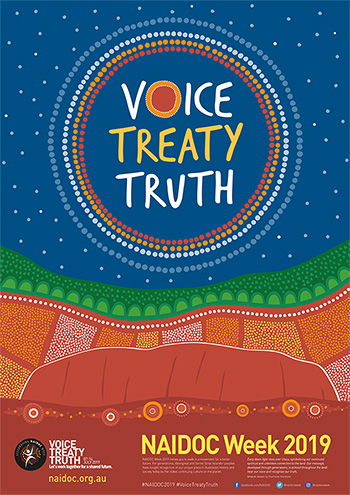Reflection on NAIDOC Week by AIATSIS CEO Craig Ritchie
As I reflect on another fantastic NAIDOC Week, I’d like to pay tribute to everyone around the country who was involved in organising events. I’d also like to congratulate all of the NAIDOC award winners, including our former Chairperson, Professor Michael McDaniel, who continue to inspire us and showcase Aboriginal and Torres Strait Islander excellence and successes to the world.
It was great to have the annual National NAIDOC Awards Ceremony in Canberra this year, on Ngunnawal Country, where I have lived and worked for over 20 years. Ngunnawal Country is now very much home for me, so it was with great pride that I joined Traditional Custodians during NAIDOC Week to launch the Ngunnawal Welcome to Country message at Canberra Airport. Ngunnawal Elder, Caroline Hughes said, “they used to take children away if you spoke language”. Now the Ngunnawal voice, in a very literal sense, is what welcomes international travellers and Australians returning home as they first step foot onto Ngunnawal Country.

NAIDOC Poster 2019 ’Awaken’ © Charmaine Mumbulla, licensed to the Commonwealth of Australia as represented by the National Indigenous Australians Agency and available for non-commercial purposes under a Creative Commons 3.0 Australia – Attribution Non-commercial No Derivative Works licence (CC-BY-NC-ND).
NAIDOC Poster 2019 ’Awaken’ © Charmaine Mumbulla, licensed to the Commonwealth of Australia as represented by the National Indigenous Australians Agency and available for non-commercial purposes under a Creative Commons 3.0 Australia – Attribution Non-commercial No Derivative Works licence (CC-BY-NC-ND).
This initiative, a first for Australia, is a very real indication of the growing prominence and celebration of Aboriginal and Torres Strait Islander culture in Australia’s national identity. Our stories, the first stories of this land, are at the heart of what it means to be Australian. So it was encouraging during the week to hear Minister for Indigenous Australians, the Hon. Ken Wyatt AM, championing an Indigenous “Voice to Parliament” and the need for it to be legislated, pragmatic and not tokenistic. Our Parliament, a pillar of Australian nationhood, is a place where our stories should be heard directly from our own people, and in a more practical sense, where policy decisions that affect Indigenous Australians have input from the very people they impact.
Many people think a new, more equitable relationship with government should be formalised through 'treaty' - which can be an emotive and polarising concept in modern debate. Consuming contemporary media, some may be forgiven for thinking treaty is a new and dangerous idea, particularly when attempting to interpret it through purely Westernised legal frameworks. But treaties have been a pillar of Aboriginal and Torres Strait Islander law for millennia. First Nations treaties were about neighbourly respect, responsibilities, boundaries, identity and belonging. These are values all Australians can appreciate. The conversation around treaty is difficult, but it must continue if Australia is to progress reconciliation.
At the foundation of any substantive progress for reconciliation in Australia is truth and truth telling. Aboriginal and Torres Strait Islander people - their resilience, success and resurgence - is at the heart of Australia’s 65,000 year story. Since 1788, colonisation has had devastating impacts on our people and culture. Australia must acknowledge this and own its history, so we can all move forward, towards a reconciled future and a stronger, more unified and inclusive national identity.
'Voice, Treaty, Truth' was this year’s NAIDOC theme and the key elements set out in the Uluru Statement from the Heart. But far from new concepts, voice, treaty and truth represent priorities of over 200 years of the Indigenous rights movement. We should be proud in 2019 of the progress we have made, but we must also acknowledge that there is still a lot of work to do.
It is time for all Australians to rally behind the final part of the 2019 NAIDOC theme - ‘Let’s work together for a shared future’.